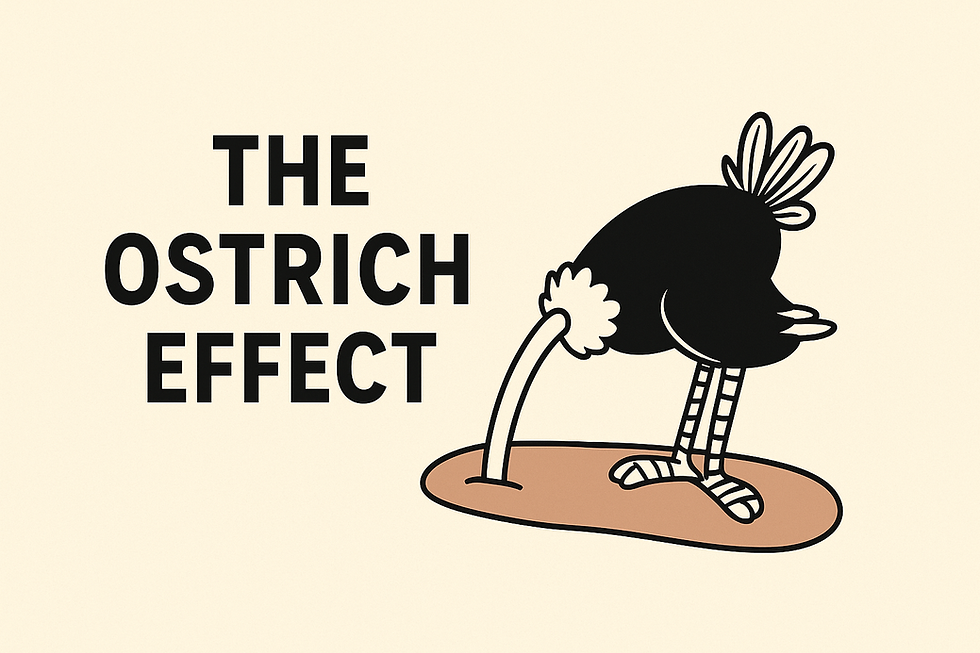The Ostrich Effect: Why Avoiding Problems Doesn’t Make Them Go Away
- Matthew Line-Hayward

- Jul 23
- 3 min read

Ever avoided checking your bank balance because you knew it was bad news? Or put off booking a doctor’s appointment in case it revealed something serious? That’s not just procrastination, it’s something known as the ostrich effect.
Named after the myth that ostriches bury their heads in the sand to avoid danger, the ostrich effect is when we ignore uncomfortable or threatening information in the hope it’ll just… disappear. It won’t, of course. But our brains sometimes convince us it will.
We’re Wired to Avoid Discomfort
Humans have a tendency to dodge discomfort. Whether it’s money, health, or hard conversations, we often avoid what feels unpleasant, even when facing it would help us in the long run.
We delay looking at our finances after a spending spree.
We put off health checks because we fear what we might find.
We ignore relationship or work problems, hoping they’ll “settle down.”
This isn’t laziness. It’s fear, anxiety, and emotional overload showing up in disguise. And it costs us mentally, emotionally, and even financially.
The Cost of Avoidance
A study by UK bank TSB found that Brits lose around £55 million every month by not addressing their finances. That’s a staggering figure, and it's not just about money. It shows how deep avoidance runs.
People would rather lose money than face the anxiety of reviewing their spending. Investors, too, often check their portfolios only when markets are rising, but ignore them when things look uncertain. Why? Because they don’t want to feel the dip.
Another study of 7,000 women between 50–64 found that those who heard a colleague had been diagnosed with breast cancer were 10% less likely to book their own check-up. That’s the ostrich effect in action. Knowing the risk made them more anxious, not more proactive.
Anxiety Is the Real Driver
Here’s the twist: we don’t avoid because we don’t care. We avoid because we care too much, and we’re scared. The anxiety doesn’t just make us uncomfortable, it takes the wheel and steers us away from the problem entirely.
In those moments, it’s not just “I don’t want to deal with this right now.” It’s “I can’t deal with this right now.” The emotion hijacks our logic. Our brain whispers, “If you ignore it, maybe it’ll go away.” But that’s rarely true.
So, What Can You Do Instead?
Recognising the ostrich effect is the first step. Next time you feel yourself resisting that bank app, that GP booking, that tough conversation, pause and ask:
What am I afraid of?
What’s the worst-case scenario… and what would I do if that happened?
What small step can I take now to reduce the pressure?
Sometimes it’s enough just to open the bank app or write the email draft. Progress doesn’t have to be dramatic, it just has to start.
Facing Reality Isn’t Comfortable, But It’s Powerful
Avoidance feels safer in the short term. But facing reality, even when it’s hard, gives us power. It lets us make decisions, plan ahead, and reclaim a sense of control.
It’s not about being fearless, it’s about not letting fear run the show.
So next time you feel like burying your head in the sand, remember: you’re not an ostrich. You’re allowed to feel scared, but you also have the strength to face what’s in front of you.
Start small. One step. One check-up. One conversation.
And don’t let the fear of discomfort keep you stuck.




コメント